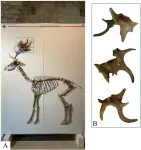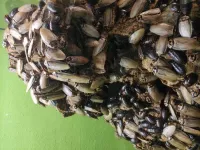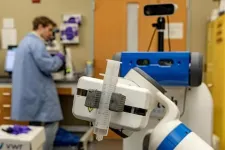EMBARGOED FOR RELEASE UNTIL 4 P.M. ET, WEDNESDAY, OCTOBER 23, 2024
MINNEAPOLIS – In middle-aged people, having risk factors like blood pressure, blood sugar and cholesterol that are not well-controlled combined with not following certain healthy habits including exercise, diet and sleep, are linked to a higher risk of stroke, dementia or depression later in life, according to a study published in the October 23, 2024, online issue of Neurology®, the medical journal of the American Academy of Neurology. These results do not prove that not having healthy habits increases the risk of these conditions, they only show an association.
The eight cardiovascular and brain health factors, known as the American Heart Association’s Life’s Essential 8 are: being active; eating better; maintaining a healthy weight; not smoking; maintaining a healthy blood pressure; getting enough sleep; and controlling cholesterol and blood sugar levels.
“Brain health is paramount for the optimal well-being of every person, enabling us to function at our highest level and constantly adapt in the world,” said study author Santiago Clocchiatti-Tuozzo, MD, MHS, of Yale University in New Haven, Connecticut, and member of the American Academy of Neurology. “Our study found that making these healthy lifestyle choices in middle age can have meaningful impacts on brain health later in life.”
For the study, researchers evaluated data from 316,127 people with an average age of 56. They were followed over five years.
Researchers looked at participants’ scores across the eight essential cardiovascular health factors and organized them into three categories: optimal, intermediate and poor.
Of the total group, 64,474 people had optimal scores, 190,919 people had intermediate scores and 60,734 people had poor scores.
Researchers then evaluated health records to identify who developed any of the following neurological conditions: stroke, dementia or late-life depression. Poor brain health was defined as the development of any of these conditions during the follow up years.
A total of 1.2% of participants met the definition for poor brain health, with a total of 3,753 conditions. Of those with optimal Life’s Essential 8 scores, 0.7% met the definition for poor brain health, compared to 1.2% of those with intermediate scores and 1.8% of those with poor scores.
After adjusting for factors that could affect the risk of these three neurological conditions, such as age, sex, race and ethnicity, researchers found that people with poor scores on the healthy lifestyle factors were more than twice as likely to develop any of the three neurological conditions compared to those people with optimal scores. Researchers also found that people who had an intermediate score had a 37% higher risk of having one of the three neurological conditions than those who had an optimal score.
“Because the risk factors we looked at are all ones that people can work to improve, our findings highlight the potential brain health benefits of using these eight cardiovascular and brain health factors to guide healthy lifestyle choices,” Clocchiatti-Tuozzo said. “More research is needed to understand this link between lifestyle habits and brain health, as well as how social factors like race and ethnicity can influence this connection.”
To confirm their findings, researchers repeated the study in a group of 68,407 participants followed for a total of five years and found similar results.
A limitation of the study was that the participants’ scores were measured only once at the start of the study, so it does not account for potential lifestyle changes during the five-year study.
The study was supported by the National Institutes of Health.
Learn more about brain health at BrainandLife.org, home of the American Academy of Neurology’s free patient and caregiver magazine focused on the intersection of neurologic disease and brain health. Follow Brain & Life® on Facebook, X and Instagram.
When posting to social media channels about this research, we encourage you to use the hashtags #Neurology and #AANscience.
The American Academy of Neurology is the world's largest association of neurologists and neuroscience professionals, with over 40,000 members. The AAN’s mission is to enhance member career fulfillment and promote brain health for all. A neurologist is a doctor with specialized training in diagnosing, treating and managing disorders of the brain and nervous system such as Alzheimer's disease, stroke, concussion, epilepsy, Parkinson's disease, multiple sclerosis, headache and migraine.
For more information about the American Academy of Neurology, visit AAN.com or find us on Facebook, X, Instagram, LinkedIn and YouTube.
END
Live well, think well: Research shows healthy habits tied to brain health
2024-10-23
(Press-News.org)
ELSE PRESS RELEASES FROM THIS DATE:
Could poor sleep in middle age speed up brain aging?
2024-10-23
EMBARGOED FOR RELEASE UNTIL 4 P.M. ET, WEDNESDAY, OCTOBER 23, 2024
MINNEAPOLIS – People in early middle age who have poor sleep quality, including having difficulty falling or staying asleep, have more signs of poor brain health in late middle age, according to a study published in the October 23, 2024, online issue of Neurology®, the medical journal of the American Academy of Neurology. The study does not prove that poor sleep accelerates brain aging. It only shows an association between poor sleep quality and signs ...
Fossils unveil how southern Europe’s ecosystem changed through Glacial-Interglacial Stages
2024-10-23
Fossils from more than 600,000 years ago reveal how Southern Europe’s animal community shifted between warm and cold climate fluctuations, according to a study published October 23, 2024 in the open-access journal PLOS ONE by Beniamino Mecozzi from the Sapienza Università di Roma, Italy and colleagues.
The Notarchirico site has long been valued as a source of information on the Early-Middle Pleistocene, with fossils stretching from around 695 thousand to 614 thousand years ago. The authors of the present study examined mammalian fossils at the site and how they might ...
Your ability to balance on one leg may be a reliable indicator of neuromuscular aging, with men and women showing significant declines over the decades
2024-10-23
Your ability to balance on one leg may be a reliable indicator of neuromuscular aging, with men and women showing significant declines over the decades
###
Article URL: https://journals.plos.org/plosone/article?id=10.1371/journal.pone.0310764
Article Title: Age-related changes in gait, balance, and strength parameters: A cross-sectional study
Author Countries: U.S., Taiwan
Funding: AR-K25AG068368 RJP-Robert and Arlene Kogod Professorship in Geriatric Medicine KRK-W. Hall Wendel, Jr. Musculoskeletal Professorship The funders had no role in study design, data collection and analysis, decision to publish, or preparation of the manuscript. END ...
Most young adults in the UK consider non-consensual condom removal during sex to be wrong and a violation of consent, with almost 9 in 10 seeing it as a form of sexual assault, per survey of 18-25-yea
2024-10-23
Most young adults in the UK consider non-consensual condom removal during sex to be wrong and a violation of consent, with almost 9 in 10 seeing it as a form of sexual assault, per survey of 18-25-year-olds
###
Article URL: https://journals.plos.org/plosone/article?id=10.1371/journal.pone.0298561
Article Title: A UK survey of young people’s views on condom removal during sex
Author Countries: U.K.
Funding: The author(s) received no specific funding for this work. END ...
Under climate change scenarios, 30-44% more land in Ethiopia might become suitable for growing arabica coffee by 2080, although some cultivated areas might also become unsuitable, per modelling study
2024-10-23
Under climate change scenarios, 30-44% more land in Ethiopia might become suitable for growing arabica coffee by 2080, although some cultivated areas might also become unsuitable, per modelling study
###
Article URL: https://journals.plos.org/plosone/article?id=10.1371/journal.pone.0310945
Article Title: Analysis of current and future bioclimatic suitability for C. arabica production in Ethiopia
Author Countries: Ethiopia
Funding: The author(s) received no specific funding for this work. END ...
Cockroaches and maggots might be able to turn an invasive seaweed into a high quality compost, finds a new experimental study which provides hope for the environment and the circular economy
2024-10-23
Cockroaches and maggots might be able to turn an invasive seaweed into a high quality compost, finds a new experimental study which provides hope for the environment and the circular economy
###
Article URL: https://journals.plos.org/plosone/article?id=10.1371/journal.pone.0311483
Article Title: Invertebrate composting quality of the invasive alga Rugulopteryx okamurae, prospects for its bio-recycling, management and circular economy
Author Countries: Spain
Funding: All the financial support has been received by professor Jose Carlos García-Gómez and any funder have influence in the research. The details are: - JCGG (68/83 / 4081/0171) Organization of American ...
Implantable device may prevent death from opioid overdose
2024-10-23
The opioid epidemic claims more 70,000 lives each year in the U.S., and lifesaving interventions are urgently needed. Although naloxone, sold as an over-the-counter nasal spray or injectable, saves lives by quickly restoring normal breathing during an overdose, administrating the medication requires a knowledgeable bystander – limiting its lifesaving potential.
A team from Washington University School of Medicine in St. Louis and Northwestern University in Chicago has developed a device that may rescue people from overdose without bystander help. In animal studies, the researchers found that the implantable device detects an overdose, rapidly delivers naloxone ...
Half of young adults support prison time for non-consensual condom removal
2024-10-23
Almost nine in 10 young adults in the UK believe that removing a condom during sex without the other person’s permission is sexual assault, and around half support prison time as a penalty, finds a new study by UCL researchers.
This is the first UK study to cover views on non-consensual condom removal. It is published in PLOS ONE and surveyed 1,729 people between the ages of 18 and 25, living in the UK.
Young people were chosen as the focus of the study as, out of all demographics, they use condoms the most.
The survey consisted of several examples of non-consensual condom removal, which ...
‘Paleo-robots’ to help scientists understand how fish started to walk on land
2024-10-23
The transition from water to land is one of the most significant events in the history of life on Earth. Now, a team of roboticists, palaeontologists and biologists is using robots to study how the ancestors of modern land animals transitioned from swimming to walking, about 390 million years ago.
Writing in the journal Science Robotics, the research team, led by the University of Cambridge, outline how ‘palaeo-inspired robotics’ could provide a valuable experimental approach to studying how the pectoral and pelvic fins of ancient fish evolved ...
Study: Robotic automation, AI will speed up scientific progress in science laboratories
2024-10-23
Science laboratories across disciplines—chemistry, biochemistry and materials science—are on the verge of a sweeping transformation as robotic automation and AI lead to faster and more precise experiments that unlock breakthroughs in fields like health, energy and electronics, according to UNC-Chapel Hill researchers in the paper, “Transforming Science Labs into Automated Factories of Discovery,” published in Science Robotics, the most prestigious journal covering robotics research.
“Today, the development of new molecules, materials and chemical systems requires ...







